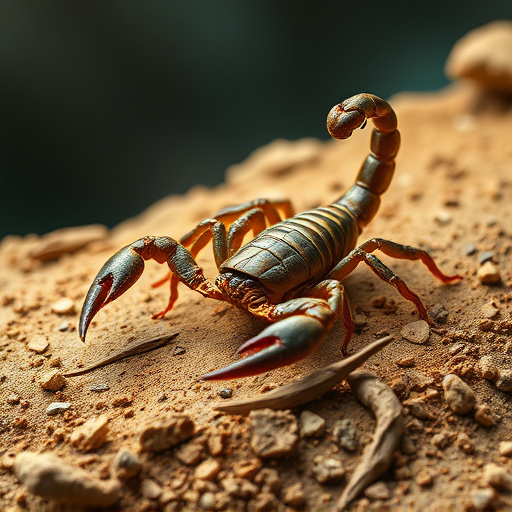Scorpion stings require immediate attention, especially for vulnerable individuals. Initial treatment includes identifying the species, cleaning the wound, applying cold compresses, and using pain relievers. Severe cases or systemic symptoms demand prompt medical help, as larger scorpions pose higher risks. Natural remedies like aloe vera and apple cider vinegar can provide temporary relief, but professional advice is crucial for proper scorpion control and management, particularly in regions with high scorpion populations. Regular cleaning, sealing entry points, and strategic planting can prevent scorpion encounters, ensuring a safer environment.
“Scorpion stings can range from painful to life-threatening, making it crucial to understand these encounters. This comprehensive guide offers essential guidelines for safe and effective treatment. From recognizing symptoms and immediate actions to first aid techniques and natural remedies, we equip you with knowledge. We also delve into prevention strategies for scorpion bites through effective control methods. Stay informed, stay safe – learn about scorpion control now.”
- Understanding Scorpion Stings: Causes and Symptoms
- Immediate Actions After a Scorpion Sting
- First Aid Measures for Different Types of Stings
- When to Seek Medical Attention
- Home Remedies and Natural Treatments
- Preventing Scorpion Bites: Scorpion Control Strategies
Understanding Scorpion Stings: Causes and Symptoms

Scorpion stings can be a concerning experience, but understanding their causes and symptoms is key to effective treatment. These stings result from the injection of venom by scorpions into their prey or potential threats, including humans. The impact varies depending on the species of scorpion, the amount of venom injected, and the individual’s sensitivity.
Common symptoms include immediate pain at the site of the sting, often described as a sharp, burning sensation, accompanied by swelling and redness. In some cases, more severe reactions may occur, leading to systemic symptoms such as nausea, vomiting, dizziness, and difficulty breathing. It’s crucial to recognize these signs promptly, especially in children or individuals with pre-existing medical conditions, as timely scorpion control measures can significantly alleviate discomfort and prevent potential complications.
Immediate Actions After a Scorpion Sting

If stung by a scorpion, immediate action is crucial for effective scorpion control and minimizing discomfort. First, try to identify the species of scorpion responsible; some are more venomous than others. If possible, take a picture or note its appearance to assist medical professionals later. Next, leave the area where you were stung immediately, as scorpions often hide in nearby cracks or crevices.
For immediate relief, wash the sting site with soap and water to reduce bacteria. Applying ice can help alleviate pain and swelling. Avoid using alcohol or vinegar, which may increase tissue damage. If symptoms persist or worsen, seek medical attention promptly. Remember that children, elderly individuals, and those with pre-existing medical conditions should be closely monitored.
First Aid Measures for Different Types of Stings

When faced with a scorpion sting, immediate first aid measures can significantly alleviate pain and prevent potential complications. The approach varies slightly depending on the type of scorpion involved, as their venom profiles differ. For instance, stings from larger scorpions like the bark or mountain scorpions often result in more severe symptoms due to their powerful neurotoxins. In such cases, quick action is crucial. Start by removing any visible stinger from the skin using a flat edge, such as a credit card, and wash the affected area with soap and warm water to minimize bacteria spread.
For milder cases involving smaller scorpions, the focus shifts to soothing the pain and reducing swelling. Applying a cold compress can help constrict blood vessels, lessen inflammation, and numb the pain. Over-the-counter pain relievers like ibuprofen or acetaminophen may also be taken to manage discomfort. Remember, proper scorpion control measures, including identifying and eliminating these pests from your environment, are vital to prevent such incidents in the first place.
When to Seek Medical Attention

If your scorpion sting is severe or accompanied by concerning symptoms, it’s crucial to seek immediate medical attention. High-risk individuals, including children, the elderly, and those with pre-existing medical conditions, should be monitored closely after a scorpion sting. Symptoms that warrant urgent care include difficulty breathing, severe pain or swelling at the site of the sting, nausea, vomiting, dizziness, or any signs of an allergic reaction such as hives or itching.
Remember, proper scorpion control involves more than just treating stings. Consulting a healthcare professional is essential to understand the specific type of scorpion involved and its potential venom effects. They can provide expert advice tailored to your situation, ensuring you receive the best care possible.
Home Remedies and Natural Treatments

When dealing with a scorpion sting, many people turn to home remedies and natural treatments as a first aid measure. While professional medical attention is crucial for severe cases, especially in children or those with known allergies, certain natural solutions can provide relief from the pain and itching associated with scorpion stings.
Common home remedies include applying aloe vera gel, which has cooling properties and may reduce inflammation, and using apple cider vinegar to neutralize the venom’s effects. Some natural treatments also suggest soaking the affected area in hot water, as heat can help alleviate discomfort. It’s important to remember that these methods are complementary and should not replace professional medical advice for severe reactions or if symptoms persist. Always consult a healthcare provider for proper scorpion control and treatment options.
Preventing Scorpion Bites: Scorpion Control Strategies

Preventing scorpion bites is a proactive approach to ensuring safety, especially in regions where scorpions are prevalent. Scorpion control strategies should be implemented to reduce the risk of encounters with these arachnids. One effective method is maintaining a clean and clutter-free environment, as scorpions often hide in dark, secluded areas. Regularly inspecting and sealing entry points like cracks and gaps in walls or doors can also prevent their entry into homes or buildings.
Additionally, using appropriate lighting near structures can deter scorpions, as they are generally attracted to darkness. Certain plants known to repel scorpions, such as lavender, rosemary, and marigolds, can be strategically placed around the perimeter of homes. Regular professional pest control services that specialize in scorpion control are highly recommended for areas with high scorpion populations, ensuring that these strategies are effectively implemented and maintained over time.
In understanding and managing scorpion stings, a combination of swift action, appropriate first aid, and preventative measures is key. By knowing the symptoms, taking immediate steps after a sting, and seeking medical attention when necessary, you can effectively treat these encounters. Additionally, implementing scorpion control strategies at home can significantly reduce the risk of bites. Remember, while many stings may only cause mild discomfort, some can be severe; thus, staying informed and prepared is vital for both safe treatment and effective scorpion control.
